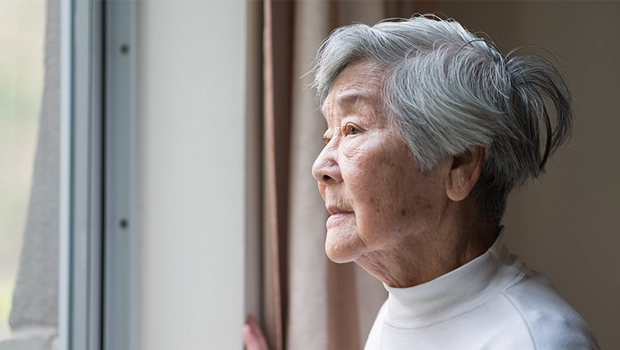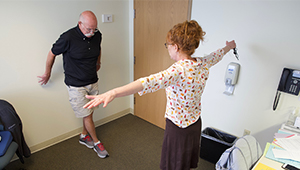Using long-term data to understand a vulnerable population

Studies offer insights into the lives of older adults with dementia who lack family
In the United States, dementia is projected to affect around 13 million adults over age 65 by 2050, according to a report from the Alzheimer’s Association. Alzheimer's disease is the most common type of dementia, but there are many other forms as well. All affect the brain, causing people to have problems with memory loss, language, mental health, and daily activities.
Two new publications from researchers and affiliates with Kaiser Permanente Washington Health Research Institute (KPWHRI) are among the first ever to provide insight into the lives of older adults with dementia who lack close family. The majority of unpaid dementia care is provided by spouses and adult children, but increasing numbers of older adults are alone when they develop dementia and do not have family members to help with their care. They represent a population that may be uniquely vulnerable to poor health outcomes and is very rarely studied.
"There is little to no research specific to this population of older adults with dementia who lack close family members," said Janelle Taylor, PhD, an affiliate researcher at KPWHRI and lead author of one of the studies. "We really wanted to find a way to understand more about what their lives look like. Are they receiving support or not? From whom? How did they come to be in this situation?"
An innovative approach
Research involving adults who have cognitive impairment, such as dementia, can be challenging because they are unable to provide informed consent. In the United States, consent can be granted by a legally authorized representative, often a family member. However, this means that patients without family members are frequently excluded.
For this project, the researchers turned to data from the Adult Changes in Thought (ACT) Study, a long-running study focused on finding ways to prevent or delay dementia. The study follows participants over time and gathers information on their physical and cognitive health. When participants enroll, they understand that they are signing up for a study that will track whether they develop dementia, and they consent to have researchers look at their medical records.
“We took an ethnographic approach to this research, which means working to situate individuals’ lives in a social context,” said Lily Shapiro, PhD, a postdoctoral researcher with KPWHRI who led the second published paper. “Usually, ethnographic research involves spending a lot of time with people who have agreed to be part of the study and speaking with them directly. In this case, because of the challenges of studying this population, we developed a different — but still arguably ethnographic — method of data gathering and analysis to understand the circumstances and life experience of someone living with dementia who lacks close family.”
The researchers approached the ACT Study data using this lens. “We did an ethnographic study of the ACT Study itself — seeking to understand how data is produced or collected, by whom, how participants move through the study phases, and how the data collected for administrative purposes can be used to understand the social and familial context of participants lives,” said Marlaine Figueroa Gray, PhD, an assistant investigator at KPWHRI and an author on both papers.
The researchers identified the most useful data sources in ACT Study records, which included data on participants’ marital status, family history, and demographics, and their living situation; handwritten comments recorded after regular visits with study staff; referral documents that contained narrative text from participants’ medical records; and administrative forms that had data on a participant’s preferred contact person and their relationship. They analyzed the notes and records qualitatively, looking for descriptions of the situations, needs, and lived experiences of the participants.
Life trajectories, care needs, and challenges
From a sample of 848 ACT participants diagnosed with dementia, the researchers identified 64 participants who did not have a living spouse or child at the time they developed dementia. Half were living alone when they developed dementia, and about one-third were living with people who were not related to them. Most were women, with a mean age at dementia diagnosis of 87.
Through analyzing the records, the researchers identified 4 themes in the experiences of the participants — life trajectories, caregiving resources, care needs and gaps, and turning points.
“The life trajectories that led people to this point were very different across our sample,” Taylor explained. “So, it is important to note that this is a situation in which anyone could find themselves, at the end of their life. Some of the participants were never married, but others were divorced, and some had just lived longer than their spouses and children.”
The researchers found that many of the people in the cohort had relationships that provided support and care. Relatives such as nieces, nephews, grandchildren, and cousins came up in the data as important contacts and caregivers. Friends and neighbors were mentioned as well, sometimes assisting on a daily basis or taking on legal tasks. However, they noted that support from such parties often stemmed from a moment when a person was in crisis and people around them were pulled in to help on a one-time basis but did not remain involved long-term. Only one person in the study sample had a legal guardian in place when they received a dementia diagnosis.
The researchers also identified important care needs and gaps. The records showed that patients struggled with medication management and daily tasks. Falling or having problems with mobility were cited as reasons for visiting the emergency room or staying in a skilled nursing facility instead of returning home. Driving was a challenge, but those who did not drive sometimes lacked reliable transportation to get to doctor’s appointments or the grocery store. Changes in neighborhood affordability affected the care networks of some people as well. In at least one case, a participant lost neighbors who had helped with shopping and transportation due to a rent increase.
In many cases, the notes also helped the researchers understand a participant’s social or family network and the progression of their health.
“Although we weren’t able to interview participants directly, what we found through our qualitative analysis of medical records and chart notes in many cases provided rich detail about a person’s life trajectory, challenges, and needs,” Shapiro said. “Because the data were generated over a long period of time and were not collected with one specific study in mind, they also allowed us insight into details that someone might not have remembered in an interview. This type of analysis could be one way to make research on older adults more inclusive, and we think it could also be valuable in other anthropological and medical research.”
The researchers wrote that the findings have implications for clinical practice and how health care functions for older adults, particularly those with cognitive impairment. They emphasized that many of the participants in the study found themselves without close family suddenly and unpredictably. Clinicians could have a role in asking older adults about the relationships they rely on, and whether they provide care for others. Early referrals to social services and access to home-based primary care could be especially helpful for those who lack a support network.
“Our results suggest that efforts to support older adults living with dementia who lack close family may need to go outside of the health system to address social health, bringing in people like policymakers and community organizations,” Taylor said.
The 2 papers were published in the Journal of Aging Studies and the Journals of Gerontology. Other KPWHRI authors are Arvind Ramaprasan, MS, and Rene Hawkes, BS.
This work was supported by grant R21AG058056 from the National Institute on Aging. The ACT Study was supported by U01AG006781. Partial support for this research came from a Eunice Kennedy Shriver National Institute of Child Health and Human Development research infrastructure grant, P2C HD042828, to the Center for Studies in Demography & Ecology (CSDE) at the University of Washington.
By Amelia Apfel
Research

Dementia risk screening tool shows promise
In a new study, a tool to help discover undiagnosed dementia performed well in 2 separate health systems.
New funding

Grant of over $55M to boost Alzheimer’s, dementia study
Kaiser Permanente Washington will co-lead an expanded ACT Program to better understand the aging brain.
live healthy

7 ways to protect your brain—and your thinking power
We’re learning a lot about how everyday actions can prevent or delay dementia. Here’s the latest advice.



